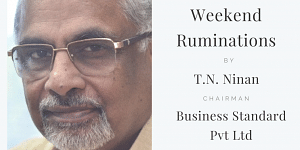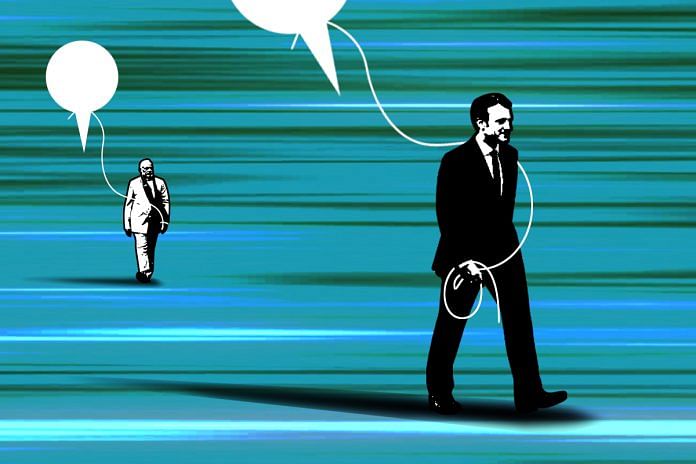President Macron has been called the equivalent of a ‘suit-boot sarkar’ but he has taken concrete steps to fasten France’s economic growth.
In his long Independence Day speech, the Prime Minister listed his government’s many achievements, said he was impatient for change and asserted that he had taken tough decisions during the last four-plus years. All of that is true even if the toughest of them all (demonetisation) was counter-productive. There can be no doubt that Narendra Modi has led a purposeful, energetic government that is not afraid to lay out ambitious targets and then try and achieve them.
 That said, the sum total of its achievements is often over-stated. After all, they have not produced growth acceleration, and the investment rate has dipped, while the undeniable improvements on other key macro-economic variables (the fiscal deficit, inflation and current account deficit), while creditable, owe a lot to lower oil prices. What Modi has managed to do when it comes to programmes is to often rename, scale up and then talk up. While this points to an underlying continuum, on balance the Modi government’s performance must be reckoned to be better than its immediate predecessor’s. What is regrettable is the reversal of the thrust of policy since 1991, towards greater protectionism, as though that is a solution to the loss of export momentum and growing trade gap.
That said, the sum total of its achievements is often over-stated. After all, they have not produced growth acceleration, and the investment rate has dipped, while the undeniable improvements on other key macro-economic variables (the fiscal deficit, inflation and current account deficit), while creditable, owe a lot to lower oil prices. What Modi has managed to do when it comes to programmes is to often rename, scale up and then talk up. While this points to an underlying continuum, on balance the Modi government’s performance must be reckoned to be better than its immediate predecessor’s. What is regrettable is the reversal of the thrust of policy since 1991, towards greater protectionism, as though that is a solution to the loss of export momentum and growing trade gap.
Also read: The Modi govt should be pleased with the IMF report on Indian economy
In the week when Atal Bihari Vajpayee has passed away, it is worth recalling his government’s economic initiatives, not to make comparisons or score points for one or the other Prime Minister but to jog one’s memory and reckon how much got done when the Bharatiya Janata Party had only a third of the seats in the house (its coalition had a small majority with the help of outside support). The reform of indirect taxation was kicked off, and has resulted now in the goods and services tax. There was privatisation rather than just disinvestment, introduction of the fiscal responsibility law, slashing of interest rates to kick off the economic boom of the last decade, telecom reform that launched the sector, an ambitious highway programme, the issuing of new private bank licences, and, of course, a major schools programme.
In terms of crisis management, there was the handling of sanctions imposed in the wake of the nuclear tests of 1998, and making sure that the Indian economy did not get caught in the swirls of the Asian crisis. The growth rates were not flattering, partly because the system was suffering from after-effects of the 1994-97 boom (the banking crisis then was worse than today’s), because of the dotcom bust, and because of poor agricultural performance caused by two drought years and three other years of sub-normal rains.
What is fair to say is that both Prime Ministers did less than what they could have. Consider what the French President, Emmanuel Macron, has done in just 15 months: He has overhauled France’s tax system, slashed the fiscal deficit to its lowest point in a decade, reduced the size of public debt in relation to gross domestic product (GDP), made the labour market more flexible, rendered life easier for small and medium enterprises, and launched a privatisation programme whose proceeds will go into an innovation fund. Next, he intends to take on pension reform (some railway workers can retire at 52 and get a generous pension), introduce merit-based pay and more fixed-term work contracts in the government, reduce the size of the bureaucracy, and invest more in both education and skill development.
Also read: No stopping fall in India’s forex levels, it now touches $400.8 billion
Some of these steps have evoked sharp criticism from the Left, others from the Right, and the results may not measure up soon — growth is still slow, and unemployment high. Inevitably, Macron’s popularity has suffered. He has been called the equivalent of a ‘suit-boot sarkar’, but he is determined to reduce the massive size of the country’s public sector (public sector wages account for a stupendous 13 per cent of GDP), make the economy more efficient, use tax changes to attract more investment from overseas, and lay the ground for faster growth. Like Modi, he is considered high-handed and arrogant, and he too gives few interviews, but it is obvious that he is the country boss making more and bigger moves than others.
By special arrangement with Business Standard.




France is equivalent in size and population of india’s one state
Where else India has 29 such states
Don’t ever try to compare a elephant (India) to a goat(France)
At least on economic growth – now that mangoes are finally being compared with mangoes, not tangerines – difficult to endorse the column’s view that the incumbent is performing better than its predecessor.